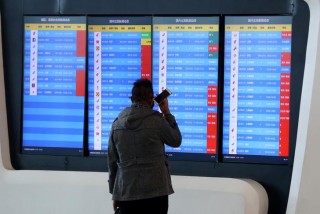Loading
Search
▼ Anxiety About Wuhan's Isolation Mounting Among Japanese Firms
- Category:Other
BEIJING - As public transportation services have been suspended in Wuhan, anxiety is mounting among Japanese people that their colleagues may be isolated in the central Chinese city, where a new, deadly coronavirus is believed to have originated.
Many Japanese companies operating in China have begun to take measures to protect the safety and health of their employees, such as urging them to avoid crowds and instructing them to go to hospital right away if they develop a fever.
But their chief concern is whether Wuhan, with a population of more than 10 million, would become an "inaccessible land," a clerk at a Japanese logistics firm told Kyodo News. "They would be unable to get food and necessities down the road," he said, referring to those workers in the city.
Some medical experts have recently warned that the new coronavirus is more infectious than the one that caused severe acute respiratory syndrome known as SARS, which raged in China in 2003, sickening 8,098 people and killing 774 across the globe.
On Thursday, a day ahead of the start of the Lunar New Year holidays, authorities in Wuhan suspended all public transport, including buses, trains, airplanes and ferries, in an attempt to prevent the spread of the coronavirus.
According to the Japan External Trade Organization, about 160 Japanese companies operate and nearly 500 Japanese citizens reside in Wuhan, located around 1,000 kilometers south of Beijing.
A Japanese businessman living in Wuhan, who is currently travelling in the southern area of China, said he is effectively stranded because of the flight cancelations.
"For the time being, I may be compelled to work in a different city. I'm worried about my colleagues left in Wuhan," he said. "Unless they have their own cars, they would struggle to secure daily essentials due to the suspension of public transportation."
So far, China has confirmed 1,287 infections and with 41 deaths from the mysterious virus, around 80 percent of whom have been detected in Hubei Province, whose capital city is Wuhan.
A large number of Japanese firms have already decided to ban business trips to Wuhan, while they have asked their employees in the city to work at home.
During the New Year holidays, the biggest celebration in China, most locals are set to go on vacation, with hundreds of millions of people expected to travel domestically and internationally.
Delivery services using smartphone apps have been widely embraced in China, but "they would not work well, given that stores and restaurants close and drivers return to their hometowns," said a Japanese housewife who has lived in Beijing for three years.
A JETRO official in Wuhan said, "It seems that many people have been rushing to grocery stores since the morning."
He voiced concern over how Japanese people left in the city will get by if logistics services are halted. "We need to consider how to obtain medicines, food and water (for them)," the official said.
In China, fears also are escalating that the infection will spread after the weeklong holidays, as Chinese health authorities have concluded that the new coronavirus is being transmitted among humans while the origin of it has yet to be identified.
Medical experts have called for people to wash their hands, gargle, and wear masks as a preventive step as influenza and colds are common at this time of year. In Beijing, masks have sold out at many supermarkets and convenience stores.
"It is now difficult to get masks in Beijing. I personally think that if people in Wuhan are put in a situation where they cannot get masks, the infection would expand further there," a physician living in the Chinese capital said on condition of anonymity.
"If the virus continues to be transmitted from person to person, it may evolve and become highly virulent. The Chinese government should take action in order not to make Wuhan reclusive," he added.
Earlier this week, Chinese President Xi Jinping pledged that his leadership will implement "decisive" measures to curb the spread of the new coronavirus.
Japan's ambassador to China, Yutaka Yokoi, told reporters in Beijing, "We will make more efforts to collect information and provide information in a timely and appropriate manner."
© KYODO
- January 26, 2020
- Comment (0)
- Trackback(0)


